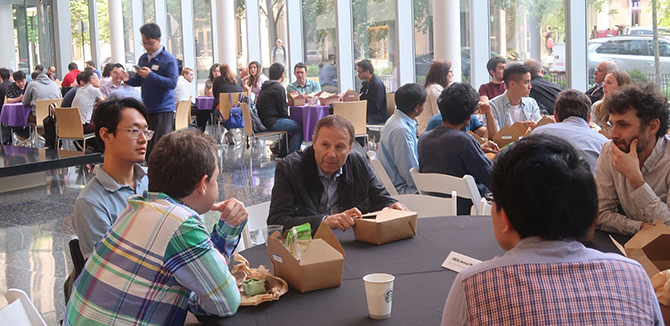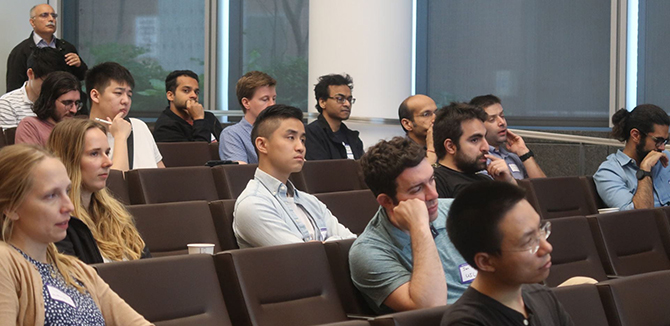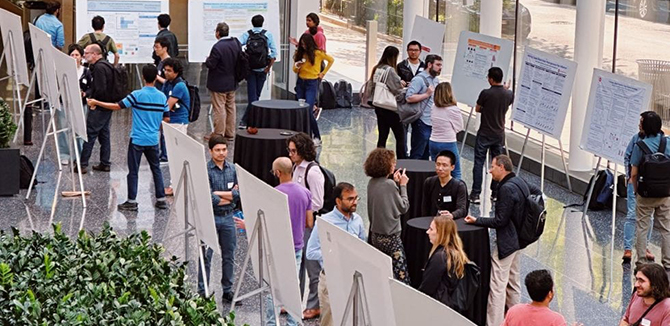Forging New Connections Within IDEAL
A team of 80 faculty members, postdocs, students, and industry representatives gathered for the daylong Institute for Data, Econometrics, Algorithms, and Learning (IDEAL) annual meeting this month at Northwestern’s Simpson Querrey Biomedical Research Center in Chicago.
The meeting was designed as an opportunity for IDEAL members across Northwestern, Google Research, the Illinois Institute of Technology (IIT), the Toyota Technological Institute at Chicago (TTIC), the University of Illinois Chicago (UIC), and the University of Chicago to review the goals and outcomes of educational and outreach activities IDEAL led over the past year, learn about events and initiatives planned for this summer and fall, showcase multi-disciplinary research, and forge new connections.
The event was organized by Natasha Devroye, professor of electrical and computer engineering at UIC and a member of IDEAL’s research committee.
“The frequent IDEAL-related events, in particular the in-person events enabled by our geographic proximity, really help foster a true Chicagoland area data science research community,” Devroye said.
Northwestern Engineering’s Aravindan Vijayaraghavan, as well as Avrim Blum and Lev Reyzin, welcomed attendees and highlighted recent IDEAL events, including the recent “Get Ready for Research” workshop, the high school teacher workshop, and the multi-day workshop in April exploring the connections among the fields of interpretability, machine learning, and logic.
Vijayaraghavan is an associate professor of computer science and (by courtesy) industrial engineering and management sciences at the McCormick School of Engineering. He is Northwestern’s IDEAL site director.
Blum, a professor and chief academic officer at TTIC, currently serves as the director of IDEAL. The UIC site director, Reyzin is a professor of mathematics, statistics, and computer science.
The IDEAL leadership also announced details of the summer student exchange program, in which PhD students will be paired with a faculty member at a different IDEAL university to promote collaboration and new research directions.
Following two keynote sessions by Ravi Kannan, recipients of the ACM Knuth Prize and a visiting professor at the Indian Institute of Science, and Alekh Agarwal, staff research scientist at Google, the organizers of IDEAL’s three main research themes — foundations of machine learning, high-dimensional data analysis and inference, and data science and society — presented mini programs with a mix of longer talks by IDEAL-related faculty and five-minute lightning talks. Northwestern talks included:
- “Bayesian Observational Learning with Imperfect Observations” — Randall Berry, John A. Dever Chair of Electrical and Computer Engineering
- “High-dimensional Limit Theorems for Stochastic Gradient Descent” — Reza Gheissari, assistant professor of mathematics at Northwestern’s Weinberg College of Arts and Sciences
- “Assigning Students to Courses” — Samir Khuller, Peter and Adrienne Barris Chair of Computer Science
"It was great hearing about all the different exciting research projects going on across the three main themes of IDEAL, and the many cross-institution, multi-disciplinary collaborations," Blum said.
The day concluded with a student poster session featuring the work of 25 students and postdocs.
Northwestern contributions to the poster session included:
- “Bayesian Learning in Mean-Field Games with Observational Noise” — Pawan Poojary, PhD student in electrical and computer engineering at Northwestern Engineering (coauthored by Berry)
- “Random Cuts are Optimal for Explainable k-Medians” — Liren Shan, PhD student in computer science at Northwestern Engineering
- The Burer-Monteiro SDP Method Can Fail Even Above the Barvinok-Pataki Bound” — Vaidehi Srinivas, PhD student in computer science at Northwestern Engineering
- “Global Optimization of Nonsmooth Weakly Convex Functions via Simulated Annealing” — Tim Tsz-Kit Lau, PhD candidate in statistics and data science in Weinberg



